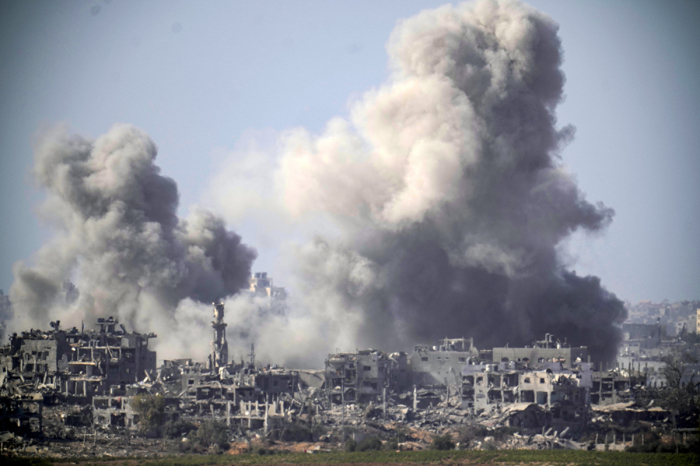
Khalil Sayegh is a Palestinian Evangelical Christian who grew up in Gaza and now lives in the United States. In the latest episode of “INSIDE THE EPICENTER” podcast from the Joshua Fund, Sayegh spoke with Joel Rosenberg, editor-in-chief of ALL ARAB NEWS and ALL ISRAEL NEWS, about the devastating toll the recent war has taken on his family and community.
From losing loved ones to the harsh realities of displacement and fear, Sayegh shared his perspective about the challenges facing Gaza’s Christians.
“The situation is very dire,” Sayegh told Rosenberg. “We are talking about less than 600 Christians left in Gaza. It used to be 1,500 before. Those who could leave have already left, in May.”
The idea of relocation — controversial and heartbreaking — has become an urgent moral dilemma for Sayegh.
“I find myself asking … shall we advocate for them to leave? Maybe we should just go to the Trump administration, tell them, ‘Listen, there are only 600 Christians in Gaza. We would rather have them leave and flourish somewhere else than all of them die.’ … I don’t know what God’s will or plan is for us.”
His perspective is not theoretical. It’s shaped by personal tragedy. When Hamas launched its brutal Oct. 7 assault on Israel in 2023, Sayegh was in the U.S. He immediately texted his family in Gaza.
“They weren’t really scared despite the bombing. … They thought it’s just another round of bombardments. And then October 8 happens and my family home is bombed. All of a sudden, my family is homeless.”
They took refuge in a church — one of the last safe spaces left for Christians. But the nightmare didn’t end there.
“I’ve lost so many people in this war,” he said. “Classmates, friends — Muslims and Christians — and family. When the bombing of the church happened on October 23, I lost extended cousins, most of them babies. … Then, after the sniper attack on the Catholic church in Gaza, my father passed away. … And my youngest sister, Lara, who had just turned 18, died while evacuating on foot to Egypt. She just collapsed. We don’t know what happened.”
Despite the overwhelming loss, Sayegh said he understood from the beginning what Hamas’ actions would mean.
“I understood how Israelis think. I understood what Hamas could have done. I knew it would be hell in Gaza. I slept that night terrified.”
When asked why he thought the war began, Sayegh pointed to a mix of miscalculations — on both sides.
“I personally think that two, most likely scenarios happened. One, that Sinwar was drunk in power and thought he could get hostages and force Israel into a deal. The second — that Iran, Hezbollah, and Syria would launch a joint attack, catching Israel off guard while the U.S. was distracted in Ukraine. Both were complete miscalculations.”
He also criticized what he views as strategic misjudgment in Israel’s policy, saying: “Israel has grown comfortable with the idea that Hamas could be managed. There was a sense that if they just gave Hamas money — Qatari cash arriving in suitcases — Gaza would stay quiet. Netanyahu believed Hamas was an asset to prevent a Palestinian state.”
“In management terms,” Rosenberg reflected, “there are tensions to be managed and problems to be solved. The Israeli government viewed Hamas as a tension to be managed.”
Even prior to Oct. 7, there was no appetite within Israel’s government or security services — or among the general public — for a major ground operation. But that calculation, like that of Hamas, was shattered by reality.
Now, Sayegh sees something unprecedented: a shift in the Palestinian street. A new poll shows 48% of Gazans support anti-Hamas protests.
“Even that number is likely higher,” Sayegh said. “Tens of thousands marched in Beit Lahia with slogans saying, ‘We are the resistance.’ That’s unprecedented. In Palestinian culture, resistance is sacred. But now people are saying — if it comes at the price of our children, we’re against it.”
He added that the protests are not only against Hamas, but also the war itself — an expression of collective despair and exhaustion.
As Israel’s war cabinet continues its campaign to dismantle Hamas and claims this is not just another “round” of conflict — but a final reckoning — Rosenberg asked what a post-Hamas future could look like.
“My vision for Gaza is one in which the Palestinian Authority, with the help of Arab states like Egypt and Saudi Arabia, leads the transition. Hamas must be dismantled, and policing must happen with Arab support.”
Rosenberg pressed him, “Are there any Arab nations actually willing to get involved?”
“Yes, but two conditions must be met,” Sayegh explained. “One, the Palestinian Authority must invite them. They’re seen as the legitimate government. Two, Israel must commit to a political plan — something like the Saudi-led Arab Peace Initiative.”
As difficult as the present moment is, Sayegh holds onto a vision of peace. It’s not naive optimism — but a hope forged in grief and faith.
This article was originally published by All Arab News.
All Arab News tracks news and events impacting the Middle East for the world’s 600 million Evangelicals.


















